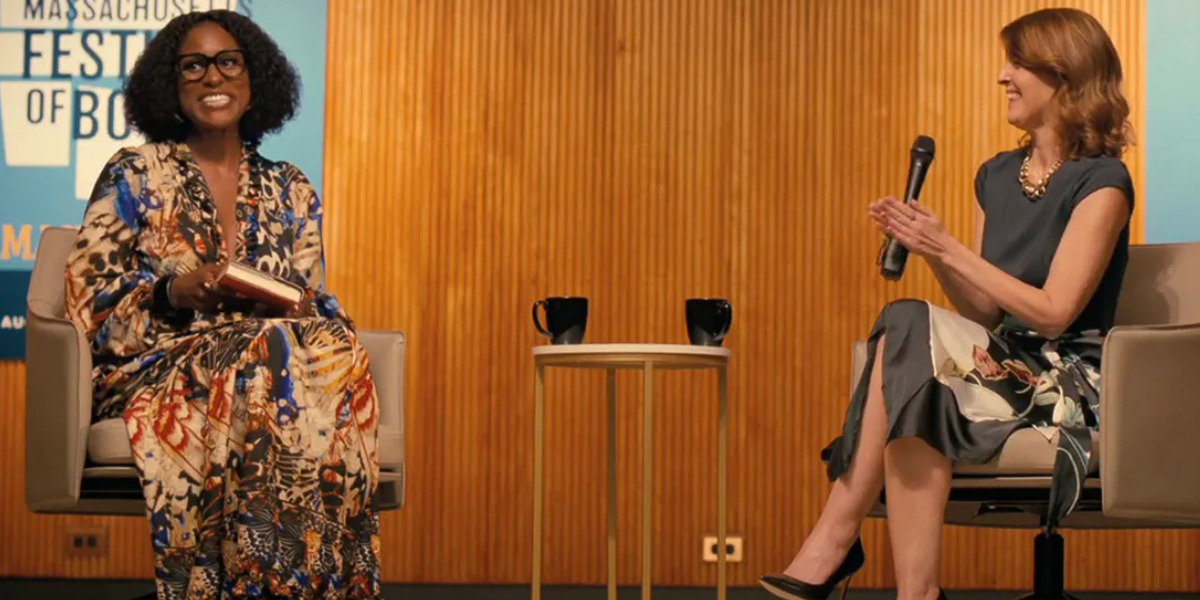Cord Jefferson’s directorial debut, ‘American Fiction,’ is a satirical film that tackles the all too socio-politically relevant topic of the culture surrounding media representation. The film follows Thelonious “Monk” Ellison, an author interested in telling rich stories that the publishing world doesn’t deem “Black enough.” Thus, the university professor finds himself at a low in his literary career while Lisa Ellison, author of ‘We’s Lives in Da Ghetto,’ rises to stardom. Infuriated by the success of books that Monk deems to be exploitative by profiting off Black stereotypes, the man decides to write one such book of his own, laced with absurd generalizations.
However, somehow, the book ends up getting published under his pen name, Stagg R. Leigh, catapulting the author into a comedy of errors highlighted by his double life. Since the film focuses on the literary world and a uniquely African-American experience through it, the authenticity of its characters and situations, however satirical they may be, remains a significant aspect of the story. Therefore, viewers must be wondering how much of real life is associated with this film.
The Source Material: Erasure By Percival Everett
‘American Fiction’ is not based on a true story and is instead an adaptation of a widely popular 2001 contemporary fiction novel, ‘Erasure,’ by Percival Everett. The book essays an almost identical story as the film, save for a more serious, while still satirical tone. In the book, Monk faces similar issues as a writer whose work is expected to fit into a specific box due to his race. While the man hates the idea of being pigeonholed, his breakout book ends up being the novel he writes to parody the famous exploitative “ghetto wanna-be” literature. The only problem? No one knows it’s a parody.

Furthermore, as Monk’s book ‘My Pafology,’ unravels in increasingly outlandish storylines, the narrative also simultaneously explores Monk’s actual life and the complications it presents, namely, his mother’s settling dementia. All in all, the novel presents a two-fold story with numerous layers about a son’s relationship with his mother and duty to his family, alongside an author’s struggle against the literary equivalent of typecasting.
Considering the occasionally obvious similarities that Monk and his creator, author Percival Everett, share, fans will be tempted to believe the former is an autobiographical version of the latter to some extent. Nevertheless, Everett has repeatedly stated that the character is not based on him, nor is ‘Erasure’ an autobiographical work. Yet, it’s worth noting that much like Monk from his novel, Everett has also shared his detestation toward being labeled as a writer by his experiences or genre. Likewise, the man also once occupied a position as a professor at the University of Kentucky.
Nonetheless, more than Monk’s shared similarities with Everett, what defines ‘Erasure,’ and subsequently ‘American Fiction’s’ roots, in reality, is its depiction of the modern literary world.
American Fiction and The Reality of Media Representation
When it came to adapting ‘Erasure’ onto the screen, filmmaker Jefferson, who wrote and directed the movie, wanted to focus on retaining the book’s spirit and emotions. The director first came across the novel in 2020 when, after only a few pages, he realized he wanted to bring this story to a cinematic adaptation. Jefferson has been previously involved in the screenwriting of numerous hit TV shows, such as ‘The Good Place’ and ‘Watchmen.’ Thus, when it came to filmmaking, adapting ‘Erasure’ into his directorial debut seemed like the right choice given his easy connection with the story.

The book delves into a conversation about Black representation in the American media, the expectations pinned on it, its pitfalls, as well as other complications. Having worked as a journalist, Jefferson could relate to the topic all too well. In a conversation with The New York Times, the filmmaker pointed out an obvious point of similarity and shared, “I wrote this article called “The Racism Beat,” which is very much about the expectation that Black journalists are just there to write about the bad things that happen to Black people and racism and violence.” As such, not only was Jefferson deeply aware of this subject matter, but he had been an advocate against it in the past, unknowingly paralleling Everett’s work. Similarly, the issue of allotting Black stories in a specific box followed Jefferson into Hollywood as well.
When Everett wrote his novel in 2001, he drew from the stifling expectations of works that often felt exploitative of Black trauma, specifically to inner-city experiences. Likewise, when Jefferson brought his iteration to the screen, he dealt with themes more relevant to 2023. “[But], there’s genres for “prestige Black projects”: slave overcoming adversity and escaping, Black civil rights activist overcoming white racism, inner-city gangland stuff, poverty, and broken homes,” said the director, sharing his experience within the industry.
Furthermore, the filmmaker also underwent similar beats in his private family life that helped him resonate with Monk’s story. Thus, Jefferson found immense relatability in Everett’s novel, which ensured an authentic book-to-movie adaptation of ‘Erasure.’ Nonetheless, the film still sports some points of divergence from its source material, mostly in favor of updating it for the contemporary world. After all, there has been a shift within the culture since 2001, given fiction novels such as ‘The Late Americans,’ a story about queer experiences, friendship, and found family by Brandon Taylor, occupy the best-selling spot as a novel by a Black author in 2023.
Nonetheless, unfortunately, the issues within minority media representation and pop culture’s perpetual obsession with pigeonholing it persist. Thus, the satirical story depicted within ‘American Fiction’ remains a reflection of reality without necessarily documenting any real-life instance.
Read More: Loved American Fiction? Here Are 10 Films You’ll Also Like


You must be logged in to post a comment.